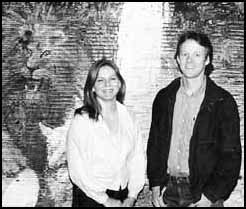You Do Not Tear Down Landmarks
By Raoul Hernandez, Fri., Feb. 5, 1999
|
|
In the looming shadow of the massive Texas State Capitol, it's easy to miss. The bus stop on the corner might call your attention to it, or the benches nearby if you need to take a load off, but if you're at the intersection of 11th Street and Congress Avenue, you're probably there for one reason only -- to conduct business at the headquarters of the most Republican state in the union -- so chances are you just walked past this historical landmark. And yet there it sits, like it has for the past 100 years: an empty lot.
Shrouded by a protective cluster of trees, this small rectangular plot once zoned a three-story building, yet is presently barren save for a few historical markers. As a matter of fact, given the size of the lot and those familiar black and gold plaques posted therein, this shaded enclave resembles nothing if not a tiny graveyard. Which is, more or less, exactly what it is.
The site of the third Texas State Capitol, on the left as you approach the current Capitol from Congress Avenue, it once supported the seat of state government. Completed in 1883, the structure served out a five-year term while the real Capitol across the street was being finished. Later housing Austin high school studios for music teachers, state capitol number three burned down in 1899 (number two had burned down in 1881). Sometime after that, the ground became sacred when the State Historical Survey Committee declared it a landmark -- a piece of real estate whose number has been retired.
|
|
About a mile down the road, south on Congress, take a right on Riverside: There stands another piece of Texas history, though there's no plaque to go with it. Actually, there's no plaque because there's no landmark. They tore it down. Put up a parking lot instead, to go with 10-15 stories of office building that may finally reach occupancy 20 years after the fact if the City of Austin buys the property. Eat enough meals at Threadgill's World Headquarters, though, and sooner or later you're bound to stumble across a couple of Austin old-schoolers in the restaurant's parking lot pointing at that many-storied office building next door, One Texas Center, trying to figure out precisely how that magical place in which they spent the restless nights of their youth once sat on the lot. You want Texas history? Forget the Alamo. Remember the Armadillo.
Originally an armory for the National Guard, the Armadillo World Headquarters ushered in the Seventies at decade's turn, and for 10 long years played host to the biggest names in music -- local, national, international. When the Reagan era began and the privately held land on which the 2,000-plus person venue sat was sold to the highest bidder, the Armadillo was gutted and killed -- torn down. What went up in its stead, besides another lovely office building that could have gone up just about anywhere, was a legend not only of local and statewide renown, but also of national and international renown -- the legend of Austin.
You see, the Armadillo was in large part responsible for the Austin of today, an unforeseen byproduct of the mutually tolerable coupling of left-wing, pot-smoking hippies (Willie Nelson) and hat-wearing, straight-laced Texas conservatives (rednecks). If that doesn't qualify the Armadillo as a cultural and historical landmark, then it's time to start prying plaques off local buildings. Visitors from around the globe still arrive in this capital city and ask where the Armadillo used to stand. That's why it's ironic that the city of Austin might one day own the land on which it sat, because they'd surely let it be torn down all over again. After all, that's what they're attempting to do with another local landmark, Liberty Lunch. They're trying to tear it down.
Built on the site of what had been a lumberyard at the turn of this century -- next to the Schneider General Store, which still stands today as a designated historical landmark -- Liberty Lunch opened in 1976, home to live music and comedy. Launched by Shannon Sedwick and Michael Shelton, who later founded Austin's musical comedy theatre troupe Esther's Follies, Liberty Lunch was little more than a stage and beer garden at its inception. When the Armadillo was torn down years later, steel beams from the legendary music venue were used to help make a roof for Liberty Lunch.
|
|
Not just a turnstile for fans of live music, however -- a former Texas shed (tin roof, no walls) with personality -- Liberty Lunch has since transcended even local "institution." It has become an Austin landmark. Like all the things that make this city such a desirable place in which to live -- the Hill Country, Lake Travis, Barton Springs, Willie Nelson, Whole Foods, Amy's Ice Cream, Waterloo Records -- Liberty Lunch is one of Austin's finest natural resources. That which helps define it, gives it an identity. And if there's one thing people the world over identify Austin with -- define the city by -- it's the local music scene. A scene in which Liberty Lunch is a landmark. And as with any building of cultural and historical significance -- in any city -- you do not tear down landmarks!
Unfortunately, that's precisely what Mayor Kirk Watson and the Austin City Council have been trying to do since last fall. In their ongoing efforts to revitalize the city's downtown sector, Watson and his faithful companion, the City Council, have been trying the ramrod approach to passing a proposed plan that would put a large information technology company, Computer Sciences Corporation (CSC), right where Liberty Lunch currently sits. Two separate six-story buildings right on the lakefront. And apartments in the vicinity as well. Queried about its real estate bonanza, CSC admitted that they hadn't even considered the spot until the city offered it to them.
Naturally, having a big, high-tech company as your long-term lessee is far more profitable than some low-rent live music venue, especially given the value of the property, but even here the city betrays its questionable business acumen by proposing lucrative development incentives meant to ease CSC into beachfront condo property worth a king's ransom. Money, development, and long-term growth are all good reasons to lure big business downtown. That's fine. But let big business build around a local landmark like Liberty Lunch; if CSC does agree to become the city's tenant, they will be required to build around the three-story Schneider General Store, the long-boarded and abandoned building holding down the northeast corner of Liberty Lunch's beer garden. Why can't this be a two-for-one deal?
For starters, Watson and the City Council have not tried to avoid tearing down Liberty Lunch. And on the one hand, who can blame them? What city government ever had the foresight to try and preserve something like a live music venue? What municipality ever thought of popular music as art? Thought of it as a vessel for culture? The city has made grand gestures about helping Liberty Lunch relocate, but all that's really meant up to this point is some city official pointing out expensive downtown properties and asking, "What about that one? Can you afford a million-dollar mortgage?" No tax abatements, no permit breaks, no sweetheart deals. Bupkiss.
Where, suddenly, are all those music-friendly city councilmembers? Daryl Slusher, you've got a lot of gall divorcing yourself completely from the left-wing agenda you ranted and raved about here at the Chronicle as politics editor. Jackie Goodman, it was this same music community that supported you every step of your political career. What have you ever done to repay that debt? Not one councilmember has called J'Net Ward to offer help or support -- to find out if they could help. "Sure, sure, the city will relocate you. Don't worry, blah, blah, blah." Whatever.
|
|
Austin should be different when it comes to an issue like this. It is different. Local politicians continually pay lip service to Austin being "The Live Musical Capital of the World," but when has one ever put their clout where their mouth is? Maybe Austin is indeed "The Live Music Capital of the World," thanks to the fact that most of its live music venues are within spitting distance of one another and foster an atmosphere of cooperation rather than competition. New York, Los Angeles, and Nashville might all boast music industry infrastructure better suited to aiding musicians, but not one of those cities nurtures its musicians and musical community on the same grassroots level as Austin does. Ask any astute musician passing through Austin, and they'll say it's something in the water. In that respect alone, Austin truly is hallowed ground.
And whatever happened to the idea of developing the area around Liberty Lunch into a West End arts district? Remember that one? Introduced into local public discourse four or five years ago, that plan involved encouraging arts-oriented businesses to move into the depressed area, which at that time counted little more than Liberty Lunch and nearby La Zona Rosa as residents. Officially, no one faction ever really moved on the West End Arts idea, but lo and behold, suddenly up rose the Austin Music Hall and a parking lot to go with it, as well as a vibrant Fourth Street corridor anchored by thriving hubs of social activity like Waterloo Brewing Company and Ruta Maya Coffee House.
Why does the city want to put a large company and housing here? At what point will that not be at odds with La Zona Rosa and the Austin Music Hall? What makes the city think that all that activity on Fourth Street won't become a major drawback to any residential accommodations in the area? Whose vision is it anyway to tear down Liberty Lunch and build Digital City? Certainly not that of the general Austin populace. Go ahead, Mayor Watson, ask them yourselves. They will tell you they don't want you to tear down Liberty Lunch. They will make it plain: You do not tear down landmarks.
|
|
This is your city, Austin, not theirs. Folks falsely assume that this battle has already been lost. W-r-o-n-g. The battle hasn't even begun yet. Watson and the council have been moving fast so that you don't notice the local ecology being irrevocably damaged, but it's far from being too late. Do you think CSC really wants this sort of public relations nightmare on their hands? Not on your life. If Ward weren't so hamstrung by the city, unable to speak out against Liberty Lunch being leveled for fear that the powers that be will turn their backs on her completely, she'd be asking for your help. She cannot. I can.
Don't let this happen, Austin. You can stop it. Stand up and be heard. If the last national election proved anything at all, it's that people, and not bipartisan politics, determine the direction we as a society are headed in. Just when everyone assumed the Republicans would capitalize on our Democratic president's personal misconduct, up stood the country and said, "Enough. We don't give a shit what Bill Clinton does behind closed doors with some White House intern. Who cares? The country, the economy, they're humming along just fine, thank you very much, leave Clinton alone. We don't want him impeached." Neither does Austin want Liberty Lunch torn down.
Send a message, Austin. Send a message that there's no mistaking. Cut out this article and send it to Mayor Watson himself, because the message is clear: You do not tear down landmarks.
Mayor Kirk Watson can be reached by mail: PO Box 1088, Austin, TX 78767; by fax: 512/499-2337; or by e-mail: [email protected]













